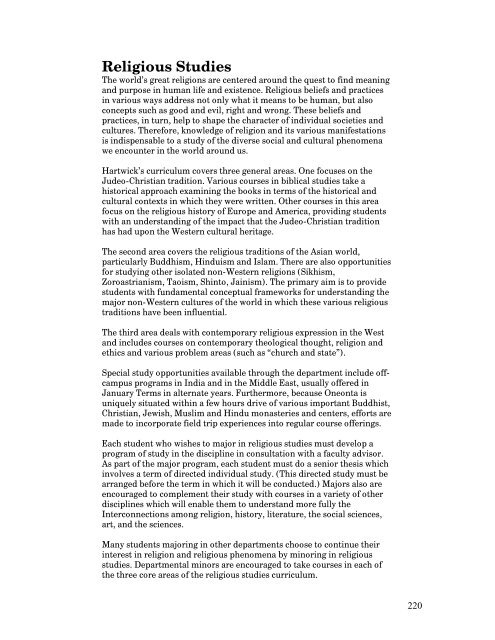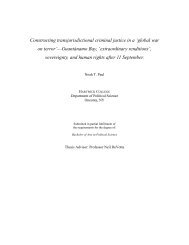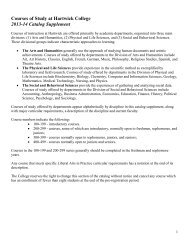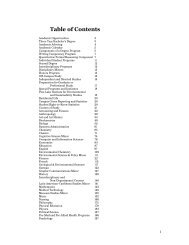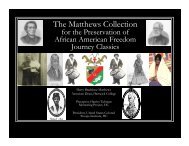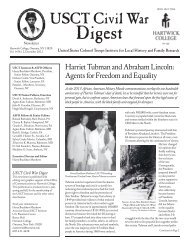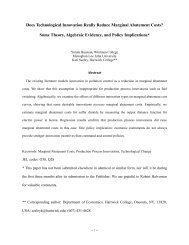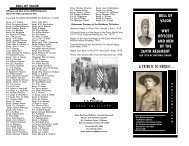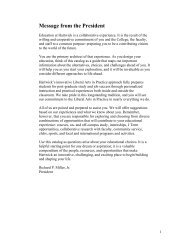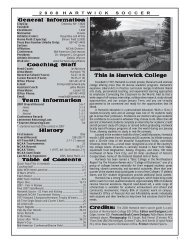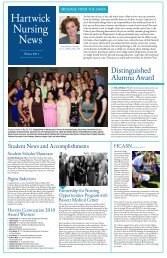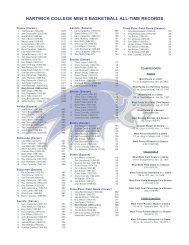Table of Contents - Hartwick College
Table of Contents - Hartwick College
Table of Contents - Hartwick College
Create successful ePaper yourself
Turn your PDF publications into a flip-book with our unique Google optimized e-Paper software.
Religious Studies<br />
The world’s great religions are centered around the quest to find meaning<br />
and purpose in human life and existence. Religious beliefs and practices<br />
in various ways address not only what it means to be human, but also<br />
concepts such as good and evil, right and wrong. These beliefs and<br />
practices, in turn, help to shape the character <strong>of</strong> individual societies and<br />
cultures. Therefore, knowledge <strong>of</strong> religion and its various manifestations<br />
is indispensable to a study <strong>of</strong> the diverse social and cultural phenomena<br />
we encounter in the world around us.<br />
<strong>Hartwick</strong>’s curriculum covers three general areas. One focuses on the<br />
Judeo-Christian tradition. Various courses in biblical studies take a<br />
historical approach examining the books in terms <strong>of</strong> the historical and<br />
cultural contexts in which they were written. Other courses in this area<br />
focus on the religious history <strong>of</strong> Europe and America, providing students<br />
with an understanding <strong>of</strong> the impact that the Judeo-Christian tradition<br />
has had upon the Western cultural heritage.<br />
The second area covers the religious traditions <strong>of</strong> the Asian world,<br />
particularly Buddhism, Hinduism and Islam. There are also opportunities<br />
for studying other isolated non-Western religions (Sikhism,<br />
Zoroastrianism, Taoism, Shinto, Jainism). The primary aim is to provide<br />
students with fundamental conceptual frameworks for understanding the<br />
major non-Western cultures <strong>of</strong> the world in which these various religious<br />
traditions have been influential.<br />
The third area deals with contemporary religious expression in the West<br />
and includes courses on contemporary theological thought, religion and<br />
ethics and various problem areas (such as “church and state”).<br />
Special study opportunities available through the department include <strong>of</strong>fcampus<br />
programs in India and in the Middle East, usually <strong>of</strong>fered in<br />
January Terms in alternate years. Furthermore, because Oneonta is<br />
uniquely situated within a few hours drive <strong>of</strong> various important Buddhist,<br />
Christian, Jewish, Muslim and Hindu monasteries and centers, efforts are<br />
made to incorporate field trip experiences into regular course <strong>of</strong>ferings.<br />
Each student who wishes to major in religious studies must develop a<br />
program <strong>of</strong> study in the discipline in consultation with a faculty advisor.<br />
As part <strong>of</strong> the major program, each student must do a senior thesis which<br />
involves a term <strong>of</strong> directed individual study. (This directed study must be<br />
arranged before the term in which it will be conducted.) Majors also are<br />
encouraged to complement their study with courses in a variety <strong>of</strong> other<br />
disciplines which will enable them to understand more fully the<br />
Interconnections among religion, history, literature, the social sciences,<br />
art, and the sciences.<br />
Many students majoring in other departments choose to continue their<br />
interest in religion and religious phenomena by minoring in religious<br />
studies. Departmental minors are encouraged to take courses in each <strong>of</strong><br />
the three core areas <strong>of</strong> the religious studies curriculum.<br />
220


